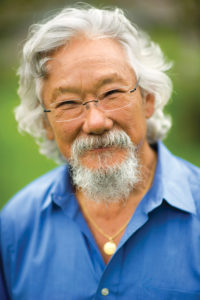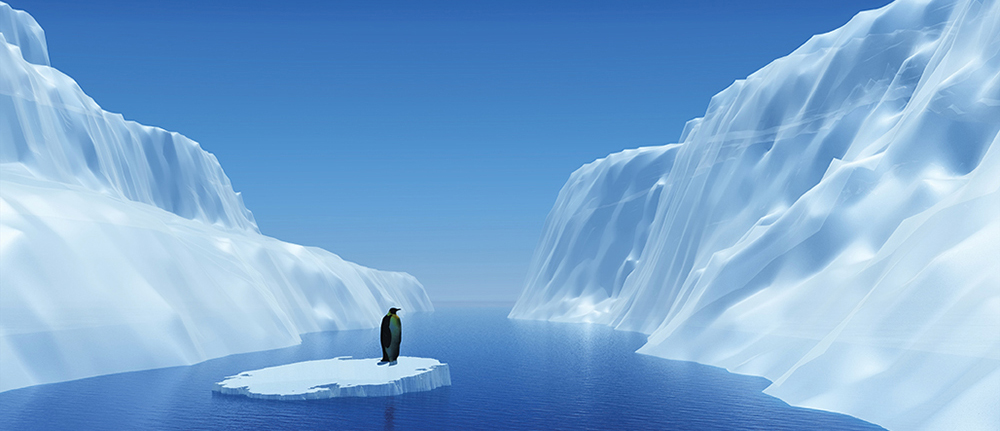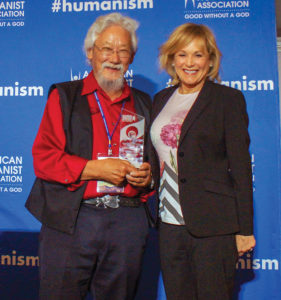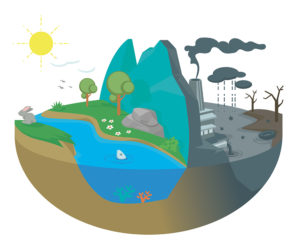Speaking as an Elder about Our Energy Future

Dr. David Suzuki is a scientist, broadcaster, and author. He is a Companion of the Order of Canada and a recipient of UNESCO’s Kalinga Prize for science, the United Nations Environment Program (UNEP) medal, the 2012 Inamori Ethics Prize, the 2009 Right Livelihood Award, and UNEP’s Global 500 award. Suzuki is professor emeritus at the University of British Columbia in Vancouver and holds twenty-nine honorary degrees from universities in Canada, the US, and Australia. He is familiar to television audiences as host of the CBC science and natural history series The Nature of Things and to radio audiences as the original host of CBC Radio’s Quirks and Quarks, as well as the acclaimed series It’s a Matter of Survival and From Naked Ape to Superspecies. In 1990 he co-founded, with Dr. Tara Cullis, the David Suzuki Foundation to “collaborate with Canadians from all walks of life including government and business, to conserve our environment and find solutions that will create a sustainable Canada through science-based research, education, and policy work.” His written work includes more than fifty-five books, nineteen of them for children. Dr. Suzuki was honored with a Lifetime Achievement Award from the American Humanist Association at its annual conference in Las Vegas, Nevada, in May 2018. The following is adapted from his acceptance speech.
WOW, THANK YOU. This is an incredible honor for me, and I’m thrilled to be recognized by the American Humanist Association.
I look at the world from the perspective of a scientist and a grandfather, but now I speak mainly as an elder, because elders are relieved from the constant search for more fame, money, or power. (There are some elders who still seek those things, but they need help.) This allows us then to speak the truth from our hearts, and if that offends people that’s their problem, not mine.
And elders have something no other group in society has. We’ve lived an entire life. We’ve made mistakes, suffered failures, and celebrated successes. We’ve learned a lot. So at this time, we must sift through our lives and grab the important nuggets to pass on to the coming generations. I tell my fellow elders: you don’t have to play games for a job, promotion, or raise, so get off the couch, or the golf course, and spend some time telling people about the lessons you’ve gained through your lifetime.
I’m especially delighted to receive this award from an American organization so that I can thank Americans who have played such a pivotal part in the formation of my life and my career. It began when I was accepted at Amherst College in Massachusetts. Amherst at that time believed that foreign students added to the education of American students, and they were willing to pay for that. They gave me a scholarship that was worth more than my father earned in a year. Now, this was 1954 so it was $2,000, and I still had to work bussing tables, but it enabled me to go to an elite school and shaped my life as a scholar.
As a foreign student at Amherst, it was arranged for me to spend Thanksgiving with an American family. And I vividly remember that Thanksgiving dinner. We got into a discussion about politics, and, to my shock, the mother started arguing vehemently with her husband, totally disagreeing with him. In my family, my mother would never dream of getting into a political discussion, let alone disagree with my father with others around. The experience provided an incredible insight for me and formed the roots of my feminism in later life.
It was at Amherst that I was taught by Professor William Hexter, who inspired me to go into a career in genetics. Having starting my senior year, I was stunned, on October 4, 1957, to hear that the Soviet Union had launched Sputnik. It was really a very frightening time; that beep, beep, beep of Sputnik passing overhead every hour and a half was a constant reminder of Soviet might.
I watched in amazement at the American response. There was no hesitation about cost or concern that the USSR was too far ahead. Americans established NASA. They pumped up the National Science Foundation, the National Institutes of Health, and poured money into universities to support science.
At first, every American rocket blew up as the Russians were racking up these firsts—the first animal in space, a dog named Laika; the first man, Yuri Gagarin; the first team of cosmonauts; the first spacewalk; the first woman, Valentina Tereshkova; the first landing of a satellite on the moon. Americans didn’t flinch and, in 1961, President John F. Kennedy announced a program in the space race to get an American team to the moon and back within a decade. What an amazing thing. Nobody had any real idea how the hell they were going to do it, but they made the commitment and poured the money into it.
Look at what happened. Not only is the US the only nation to land people on the moon, but every year when Nobel Prizes in science are announced, who gets most of them? American scientists or scientists working in the United States! And every year NASA publishes Spinoff, which lists literally hundreds of things that have been developed as a result of space technology. Things like laptop computers, GPS, the twenty-four-hour news channel (well, maybe that one’s not so great) space blankets, ear thermometers, and just dozens and dozens of spinoffs that all came out of that commitment to beat the Russians to the moon.
“I got a call from the CEO of one of the largest companies in tar sands asking if he could talk with me. I said, ‘of course. I’m not into fighting. We’ve all got to be winners.”
Today when I hear Americans complain of the cost or the impossibility of getting off fossil fuels to confront the challenge of climate change, I’m absolutely shocked. It’s not the American way, at least not the America I knew when I lived here for eight years. It’s un-American to say we can’t do it or it’s too expensive.
After I got my PhD in Zoology from the University of Chicago in 1961 I decided to return to Canada. I took the first job I could get, which was at the University of Alberta in Edmonton, and the following year I moved to the University of British Columbia (where it was warmer). But during the year I was at Edmonton (1962-’63) two very important things happened. There was a program on the local TV channel called Your University Speaks and I was asked to give a talk on genetics. The producer loved it so much I ended up doing eight programs on genetics, my first television series. I remember vividly that he said I had a knack for making obscure scientific ideas exciting and understandable for the public, and I realized that was something I could do. I understood that television was a very powerful educative tool, and so I embarked on a second career in television.
At the same time, my hopes of becoming a world-famous geneticist were derailed by a woman to whom I’m ever grateful. Her name was Rachel Carson. In 1962 Carson published Silent Spring all about the effects of pesticides. Remember that when Paul Müller discovered that DDT kills insects, we celebrated, and he was awarded the Nobel Prize in 1948. But it was Carson’s book that told us, look, it’s not all wonderful. There are consequences of powerful technologies.
As I read the book, I realized that the power of science is also a fatal weakness. Scientists learn about the world by focusing on a part of nature. Whether it’s a subatomic particle, an atom, a molecule, a cell, an organ—focusing is the important thing, isolating it so that we can control everything impinging on that part of nature, and we acquire tremendous power over it. But in focusing, we lose sight of the context within which that part of nature exists. Scientists could say if you spray DDT on a farmer’s field, you’ll kill insects. But of course everything is connected, and you end up affecting fish and birds and human beings. By the 1960s, women’s breast milk was considered toxic to babies. Carson pointed out that when eagles began to disappear in the United States, scientists tracked down the cause and discovered a phenomenon we hadn’t even know existed in nature called biomagnification. DDT sprayed in parts per million was absorbed by microorganisms that weren’t killed by it and concentrated it. At each level up the food chain it’s concentrated so that by the time it gets to the fatty tissue in the breasts of women and the shell glands of birds, DDT has been concentrated hundreds of thousands of times. Scientists didn’t know about this phenomenon when we began to use DDT in massive amounts.
Similarly, when atomic bombs were dropped on Japan in 1945 we didn’t know there was a thing called radioactive fallout. That was discovered at the Bikini Atoll years later. We didn’t know there were electromagnetic pulses of gamma rays that knock out electrical circuits. We didn’t know there was the possibility of nuclear winter. All this happened after we used the technology.
The same happened with chlorofluorocarbon (CFC). Who would have imagined CFCs would be used in such quantities. The molecules would waft up into the upper atmosphere where ultraviolet light from the sun would break free radicals of chlorine off CFCs and they destroy the ozone layer. The first time I heard it, I didn’t even know there was an ozone layer up there to destroy.

We haven’t learned enough humility in science. We think science is the key that will to lead us into economic nirvana. And so we’re going into genetic engineering, nanotechnology, artificial intelligence, robotics, geoengineering. I think we should remember the experiences of past technologies. We don’t know enough to be able to anticipate all of the consequences of powerful technologies.
In the last century, human beings have undergone an incredible transformation that is having an impact on the planet. The first factor, of course, is our numbers. I was born in 1936 when there were just over two billion people. So in my lifetime, the population has increased more than 300 percent. And every one of those added human beings has to be fed, clothed, and sheltered. We have a big ecological footprint. It takes a lot of air, water, and land just to keep us alive.
My parents were married during the Great Depression, and the message they drove home to me was: live within your means; save some for tomorrow; share, don’t be greedy; help your neighbors, you may one day need their help; work hard for money to buy the necessities in life, but don’t run after money as if having more money makes you a bigger and more important person.

Former board member Debbie Allen presented David Suzuki with the Lifetime Achievement Award at the annual conference.
But now we live in a world in which the economy has become so important. And consumption in North America is 70 percent of that economy. We’re now in the business of servicing our wants, not our needs. To me, the ultimate expression of what we have become is the fact that I’ve worn blue jeans all my life because denim wears like iron, but today people are paying hundreds of dollars for brand new jeans that are already ripped. Now, what the hell is that?
So, we’ve got a global economy that is spreading our products around the world, and in the last century we’ve undergone a massive shift in the way we live. In 1900 there were only fourteen cities with more than a million people. The vast majority of people in the world, including North America, lived in rural village communities. Fast-forward to the year 2000 and more than half of the six billion people of the world are living in hundreds of big cities.
When we live in big cities, nature becomes something we have to try hard to experience. The most important priority becomes our jobs. We need a job to earn the money to buy the things we want. And so we get to a place where our leaders say we can’t do anything about global warming, because reducing emissions will destroy the economy. They elevate the economy above the very atmosphere that gives air to breathe and weather, climate, and seasons.
So, when you add all of these things together—our numbers, our technology, our consumption, our global economy, and our urban living—we have become a force as no other species has ever been. That’s why scientists now refer to this period as the anthropocene epoch, the period when humans are the dominant factor shaping the physical, chemical, and biological properties of the planet on a geological scale.
The problem is we’re transforming the planet, but we don’t know how to do it in a way that’s sustainable. We’ve become so puffed up, so impressed with ourselves that we think that our creations—capitalism, economies, religions, corporations, markets, governments, political parties—are the most important factors that shape the way that we live. These are not forces of nature. We invented them. We can’t change the natural world, but we can certainly modify our creations to fit in a better way with the real world.
I’d just like to tell you one story, if I may. I’ve been battling with the tar sands’ interests in Alberta for many years. Four years ago I got a call from the CEO of one of the largest companies in tar sands asking if he could come and talk with me. I said, “of course. I’m not into fighting. We’ve all got to be winners.”
He came down the next day and I thanked him profusely for doing so. Then I said, “before you come into my office, I want you to do me one favor. I want you to leave your identity as a CEO of an oil company outside so I can meet you as one human being to another and find out what do we agree on. If we don’t start with a platform of agreement, what’s the point of all of the negotiations? We’re all over the map.”
I could tell from his body language this wasn’t what he came down for. But to his credit, he came in the door. So I said, “thank you for doing that, Mr. CEO. Let me explain what I mean here. We live in a world that is shaped by laws of nature, and we have to live within those laws. There’s nothing we can do about it. Physics tells us we cannot build a rocket that will travel faster than the speed of light, that you will fall if you trip, and that the first and second laws of thermodynamics mean you can’t build a perpetual motion machine. These are dictated by the laws of physics, and we live within them.”
“In chemistry, it’s the same. The atomic property of the elements dictate the melting point, freezing point, boiling point, reaction rates, and diffusion constants. All are dictated by the properties of the elements and determine what we can and cannot synthesize and so we live within those constraints.”
 “In biology, it’s the same. Every species has a maximum number that can be sustained indefinitely, and that’s determined by what is called the ‘carrying capacity’ of an ecosystem or a habitat. Humans are not limited to an ecosystem or habitat, we adapt to different environments. But the biosphere is our home and it’s fixed and cannot grow. And of course our impact on the biosphere is determined by two things, our numbers and our per capita consumption.” And then I said, “Mr. CEO, we are animals. Biology tells us that. And as an animal, what is the most important need every human being has?” And instead of giving me the answer right away, he paused and thought about it. I said, “look, if you don’t have air for three minutes, you’re dead. If you have to breathe polluted air, you’re sick. So do you agree with me clean air is our highest priority and we have a responsibility to protect that?”
“In biology, it’s the same. Every species has a maximum number that can be sustained indefinitely, and that’s determined by what is called the ‘carrying capacity’ of an ecosystem or a habitat. Humans are not limited to an ecosystem or habitat, we adapt to different environments. But the biosphere is our home and it’s fixed and cannot grow. And of course our impact on the biosphere is determined by two things, our numbers and our per capita consumption.” And then I said, “Mr. CEO, we are animals. Biology tells us that. And as an animal, what is the most important need every human being has?” And instead of giving me the answer right away, he paused and thought about it. I said, “look, if you don’t have air for three minutes, you’re dead. If you have to breathe polluted air, you’re sick. So do you agree with me clean air is our highest priority and we have a responsibility to protect that?”
And then I said, “you and I are 60 to 70 percent water by weight. We’re just a big blob of water with enough thickener added so we don’t dribble away on the floor. But we leak water out of our skin, from our eyes, and our crotch. Mr. CEO, if you don’t have water for four to six days, you’re dead. If you have to drink polluted water, you’re sick. So doesn’t clean water join clean air as our highest priority and our greatest responsibility to protect?”
“Then there’s food,” I said to him. “Four to six weeks without food, you die. Most of our food grows in soil. If you have to eat polluted food, you sicken. So clean soil and clean food joins clean water and clean air.” Finally, I said, “every bit of the energy in our bodies that we just consumed for dinner tonight, that we need to move and grow and reproduce and do work, is all sunlight that is captured by plants and converted into chemical energy. We then get it by eating plants or animals that eat the plants. And when we need to work or move, we burn those molecules and release the energy of the sun back into our bodies. So photosynthesis joins clean water, clean air, clean food, and soil.”
“Mr. CEO,” I concluded, “the miracle of life on Earth is a combination of four things which Indigenous people call earth, air, fire, and water and which are created, cleansed, and replenished by the web of living things. It’s all the green things in the oceans and on land that are taking carbon out of the air and putting oxygen back. Without them, there wouldn’t be oxygen in the air. Life is part of the hydraulic cycle and cleanses water. All our food was once alive, and life creates soil. Other things, like corporations, religions, economies, borders around countries and states, and so on, are human constructs and they can be adapted or changed to fit and support those fundamental needs.” I told him if he shook hands with me on that, I’d do everything I could to help him and his company. Of course, he couldn’t or wouldn’t shake hands with me. He left a very dispirited man. He was a good man. He never contacted me again but a year later, he resigned. If he’d gone back to his shareholders and said, “look, I agree with Suzuki, we can’t do anything to affect air, water and soil,” he would’ve been fired because that’s not his job.
When I look at the negotiations over climate change and our energy future, to see corporations in there negotiating doesn’t make any sense because it’s not in the corporations’ interest to care at all about the atmosphere. So we have to come to some kind of policy and strategy, and then make corporations conform to them as we meet the challenge of climate change.
